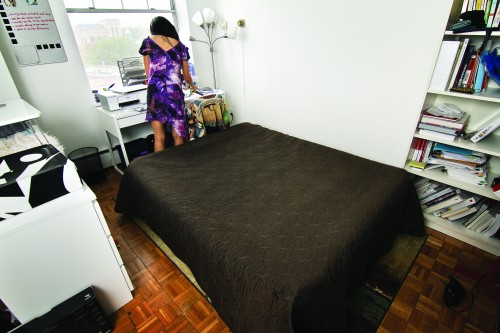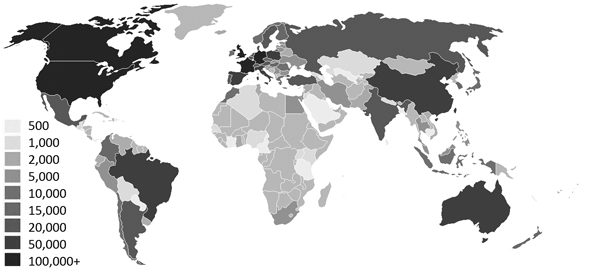Eva Song’s one-bedroom apartment, on the sixth floor of Taft Apartments at 265 College St., is cluttered. A tall black loft bed stands in the center, surrounded by various objects: a painting of a Venetian mask hangs to the floor with cardboard boxes full of rolled-up artwork underneath; a bookshelf on the other side of the room holds The Official Guide to the GRE, Frida Kahlo: Song of Herself, and manuals for Adobe Illustrator and InDesign; two coffee tables, both from Ikea, face each other at awkward angles.
On the floor, Song has set up an air mattress for the strangers she regularly invites to pass through her apartment, when she temporarily pushes the bean bags and other colorful debris to the side. As I talk to Song in her room, I imagine her toiling on an art project while the stomach of an unfamiliar traveler rises and falls heavily across the room.
Song is a member of Couch Surfing, an online network through which travelers can contact locals for a place to stay and find people who will offer them a mattress to stay on, and possibly food, a tour, a party, or advice. Since she joined the network two summers ago, she has hosted and met students and travelers from all over the world.
A small but vibrant community of New Haven Couch Surfers exists within and beyond Yale. Couch Surfing allows Song — and the few other Yale students involved— an escape from what she describes as a culture of single-mindedness at the university. For these students, inviting strangers into their homes is a way to connect with a network of travelers who envision a more interwoven, understanding world.
Song, an art and political science double major, is from Chengdu, China. Originally enrolled in the class of 2013, she took a gap year after a freshman year filled with confusion and self-doubt. “Before college I just knew I was going to go to America, that was the plan,” she tells me, while sitting in a pile of art supplies and cosmetics on her floor, “but when I came here I didn’t really have a goal anymore, a plan.”
She needed, urgently, to get away. In her year off she, among other things, worked at a radio show in Uganda, volunteered at a school outside Beijing, took a diving course in Australia, and travelled through Europe. Going away gave Song perspective, and after a year she was ready to return.
When Song came back to Yale for her sophomore year, she lived on campus in Pierson College. The following summer, she made a permanent move to her current apartment and began hosting foreigners passing through the city. Bringing in people with outside perspectives, like those she had observed while travelling, helped Song accustom to being at Yale once more. Couch Surfing has provided her an escape from the goal-oriented attitude that can pervade life at Yale. “People tend to get similar if they stick together for too long,” she explained.

Couch Surfing purports to be “a global network of travelers, adventure seekers and lifelong learners” valuing diversity, openness, and sharing. Based in San Francisco, the Couch Surfing project was conceived by Casey Fenton in 1999. Fenton came up with the idea after, finding an inexpensive flight from Boston to Iceland, he e-mailed 1,500 students from the University of Iceland asking for a place to stay, and received more than 50 offers. Couchsurfing.com went public in January 2004; eight years later, the site has 5.2 million members and is the most popular free accommodation site on the web. The United States has the most Couch Surfers in the world, followed by Germany, France, England and 203 more countries.
Couch Surfing is changing the nature of travel. When I travelled around Europe last summer — without the help of Couch Surfing — I felt most connected to the cultures I experienced when interacting with the people I met along the way. Having meaningful conversations with the man renting me a bike a town outside of Paris, or the Swiss man and his mother on a train through the heart of Germany, or even a roofer from Oakland who had been at the running of the bulls in Pamplona the week before, made me feel like I was part of a greater global network and sharpened my sense of how the world works.
According to Jeremy Rifkin, a best-selling author and economic advisor to the European Parliament, the technological and economic innovations that have pushed human history forward are also pulling us together. In his book The Empathetic Civilization, Rifkin argues that we have a natural impulse toward empathy and that globalization nurtures this impulse by exposing us to more people from more places. We have moved, he claims, from a macro-society of diffuse, conflicting communities to a more cohesive, communicative one. I believe that Couch Surfing is both a result and an agent of this change—it exists because the world is increasingly tolerant, and it helps to connect individual communities even further.
In the past three years, undergraduates living off campus at 216 Dwight St. have hosted many Couch Surfers, and it became a tradition of the house. Travelers slept in a sunny nook on the house’s first floor — last year, there were two comfortable black sofas perfect for weary bodies, and they had extra mats in case people come in groups larger than two.
When Brandon Jackson ‘13 lived there last year, he and his housemates hosted seven groups of Surfers from Germany, China, Poland, and Russia as well as within the US. One girl visiting from Asheville, North Carolina, came to New Haven to undergo month-long treatment for Lyme disease, and the housemates offered to let her stay for an extended period of time. The first night she was in the house, she figured out how to fix their house’s fireplace, which had been broken for years. She also offered to pay some money for the utilities bill.
There’s an unspoken code of ethics among Surfers, Jackson said. Many offer to help out around the house or contribute to the household in any way they can. People know and respect the etiquette. “If not, it quickly escalates into an uncomfortable situation,” he said. But the code differs by country. Like Song, Jackson took a year off from Yale, in his case after sophomore year. He has Surfed about fifty times in his travels around Europe and the United States. None of his hosts asked him to cook or clean in the European countries he stayed in. “When I was traveling, I was treated like a prince,” he said.
Jackson lives on campus this year in Calhoun and plans to host travelers in his single this year. He said he would give up his bed and spend the night somewhere else. He said he hosts Couch Surfers because the happiness he gains from it never diminishes, even as he brings in more and more people. Each experience seems brand new.

The New Haven Couch Surfing community gets together once in a while—they had three or four meetups last spring. People connect through the online Yale/New Haven group on the Couch Surfing website, which consists mostly of Yale students and alumni. When I browse the site’s accompanying discussion board, I find a wide variety of requests. A Yale couple from Ohio, “Mike and Jing,” are looking for someone to move into a house a one-minute walk away from New Haven’s beach on the Long Island Sound. In July, a user named Dessi sent out a message asking for participants in “Tuesday Trivia.” Shawn and Molly Persinger advertised a musical event: “PRESTER JOHN: Live House Concert.” A man named Torsten asked the board where he could find 0.0 strength colored contact lenses near New Haven. The nature of the community allows them to ask for almost anything and they seem to expect their requests, no matter how peculiar, to be answered. In addition to connecting travelers in person, Couch Surfing has established a culture of expectation and reward, of communal exchange.
Most Couch Surfers that stay with hosts from the Yale/New Haven group are students. Jeeva John, a fourth year medical student at the University of Glasgow, traveled from Scotland to New Haven to work with a Yale neurologist for five weeks last summer. She met up with Song a few times in New Haven and the two travelled together to visit Boston. John said taking a trip with a stranger “was sort of a leap of faith I guess, but it made the whole experience less lonely, more interesting.”
The intimacy that results from Couch Surfing is singular. “There’s an immediacy to the relationships formed through Couch Surfing,” said Hans Schoenburg ’10, who has been hosting since his senior year at Yale, when he lived at 216 Dwight. “It’s not like ‘break the ice,’ it’s ‘go straight to the heart.” He still regularly hosts travelers in his New Haven home.
Song sometimes feels awkward around her Surfers when she first meets them, but that discomfort soon wears off. The intensity of Couch Surfing relationships is exciting to her. “People can be interesting in little bits—you get little tastes of people,” she said. She has had conversations with her Surfers about her problems, her relationships, her anxieties, ones that she wouldn’t have with her closest friends.
Clément Casse, a student from France studying for a master’s in economics, stayed with Song for ten days last summer, and they took a spontaneous trip to Niagara Falls together. Couch Surfers often act at the spur of the moment, milking the personal connections they make. The interactions mirror Rifkin’s vision of a tighter-knit planet made up of transitory relationships between strangers.
The current residents of 216 Dwight — six juniors who moved in this fall — have not hosted any Surfers yet. They plan to have a house meeting to discuss the possibility at the end of this semester, after they get used to living together. Sebastian Monzon ’14 said he is excited at the prospect of meeting new people from interesting places. He likes the idea of the network, of bringing people together and sharing stories, but he is also a little tentative about the responsibility hosting entails.
Although technically he is bringing visitors into the Yale bubble by hosting Couch Surfers, Jackson said his experiences also help him step outside of the stress and pressure that comes with being an undergraduate at the university.
Once he hosted a man from southwest China who was “giddy” to be touring Yale’s campus. Jackson returned to his room one night, overloaded with homework and activities, and vented about it to his new housemate. He said the man ordered him to stop working and to have tea with him instead, snapping him out of his anger and giving him a better perspective on his situation.
Song also indicated that part of Couch Surfing is almost therapeutic. Going away for a year balanced her, gave her perspective, prepared her to return to college. By bringing strangers into her home, she keeps her hand outstretched to the world that brought her in.


